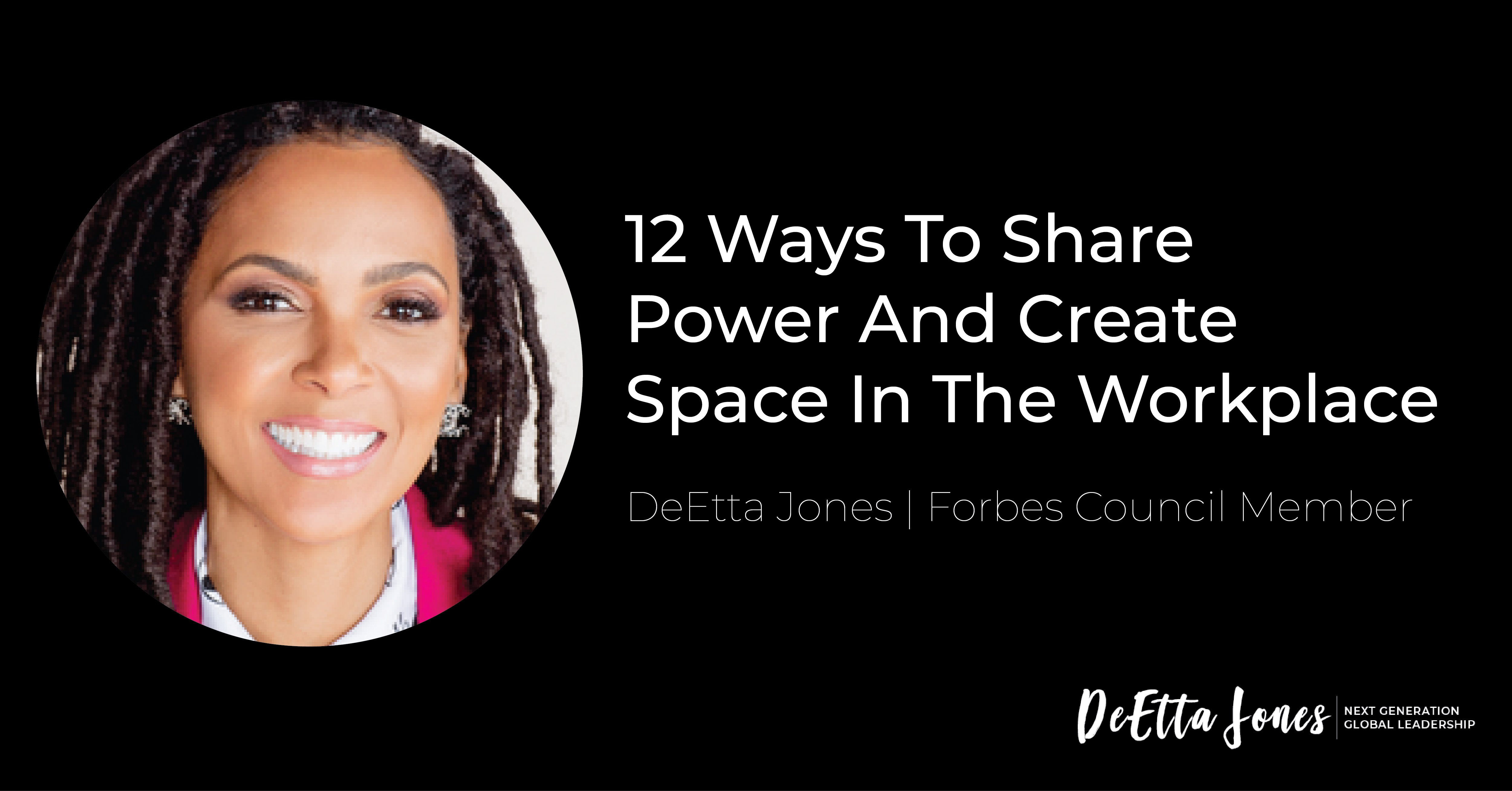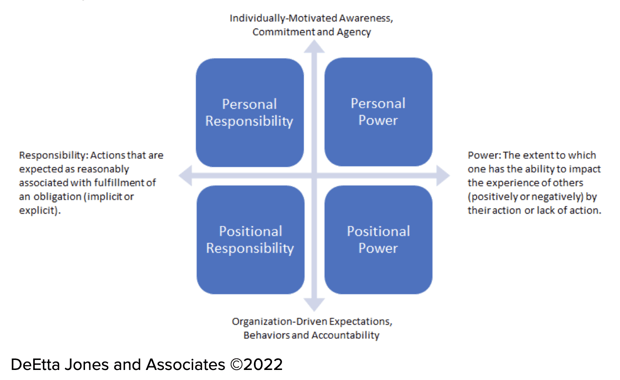This blog was originally published in collaboration with the Forbes Business Council.
Workplace expectations for leaders and managers have changed. From my perspective, replacing traditional notions of power are more inclusive values of power sharing and creating space for new voices and access. Amidst these shifts, questions about how to have and use power persist.
Consider Your Power
Power is not taboo. In fact, power is necessary for influence and agency. How power is used and for what purposes it is accumulated and leveraged are the far more important issues. I believe power exists when a person has the ability to impact the experience of someone else.
As you consider your power, think about the different bases of power you have and to what degree. Are you able to hurt, judge or embolden someone else? Are you able to share or withhold something of value, such as information or time? None of these require a position in a hierarchy; they are examples of referent power that comes from your ability to nurture relationships and others viewing you as a go-to source or influencer.
Are you a manager? If yes, then associated with that role, you have positional power. Do others have more positional power than you? Yes, your boss does, as does your boss’s boss and so on. If you are technically proficient in subjects that result in others often seeking your counsel for technical support, then that is a base of power. Of course, identities and access to resources are also bases of power, along with a list of other personal and institutional dimensions.
Power And Responsibility
Every member of an organization has the responsibility to exemplify the values of inclusion and equity. Therefore, it is incumbent upon all of us to understand the implications of personal choices and actions. From my perspective, an organization’s culture, practices and degree of health are not driven by policies or mandates; they are the result of a collective effort of aligned personal choices that are made on a day-to-day basis and informed by an overarching set of equity-based values.
Although there are many ways in which power is exerted and experienced at systems levels, the opportunity to make an impact at personal levels cannot be understated. Simple and powerful actions, such as modeling inclusive language and displaying empathy for others, can make a huge difference.
Some degree of power is possessed by every person within the workplace, regardless of role. Your values determine how you use the power you possess, and how you use your power is a reflection of your values in action. This level of personal commitment across an organization amplifies the total power available and creates a foundation for more power sharing.
Leaders And Managers
Power and responsibility are still associated with one’s position in the organization, however. Leaders and managers have a particular and unique opportunity to role model inclusive behaviors in ways that set the tone and establish a clear expectation for performance. This type of power is related to their position, and its presence does not assume negative motives. It is the nature of power distribution within hierarchies. As with personal power, I believe how positional power is used is based on values-driven behavioral choices.
The difference, however, is that leaders, managers and others with positional power have a broader base of this particular type of power and thus more opportunities, in the context of the workplace, to leverage it for influence. Access to more power also means more responsibility for action. Below are 12 suggestions for acting on inclusive values and leveraging your power to create space for others.
12 Ways You Can Share Power And Create Space
1. Acknowledge your power. You can’t share power you don’t have, and having power doesn’t mean you are a bad person. It’s how you use your power that’s most important.
2. Look for and act on opportunities to help others extend a particular base of power that you have more of and would be helpful to them. For example, use your positional power to recommend people with less positional power for high-profile assignments, such as chairing a committee, giving a speech, co-authoring a paper or being promoted to a higher-level role in the organization.
3. Design meetings with the intention of sharing power and creating space. This means incorporating opportunities for everyone to speak and soliciting ideas from people who are often quieter, new or have less positional power than others in the group.
4. Move out of the spotlight, and hand it to someone else with care and permission. This is called “de-centering” oneself.
5. Shift your mindset from delegation to co-creation. You don’t have all the answers or insights on how a decision will impact or be received. Invite and authentically engage people from underrepresented, under-resourced groups to the proverbial table from the beginning and create a shared and mutually beneficial path forward.
6. Catch people doing a good job and acknowledge it—especially those who often go without deserved recognition or are the steady contributors who keep projects on track. Share your positive feedback one-on-one and in groups, particularly when higher-ups are present.
7. Challenge your own assumptions.
8. Challenge the assumptions and, if necessary, actions of others.
9. Avoid making assumptions. Instead, ask others to share what they are thinking, want or need.
10. Invite co-creation and leadership on visible projects, including opportunities to speak on behalf of the organization.
11. Identify people to champion. Being a champion is an active, out loud, day-in and day-out commitment to open doors, challenge the naysayers and enable a flow of information and resources to people and groups who otherwise might not be considered for them.
12. Ask for and incorporate feedback. Keep the gap between your intentions and impact as small as possible.
As we navigate an ever-evolving workforce and its many relationships, power and responsibility will continue to be central. Begin by paying attention; spend more time imagining desired outcomes; act in large and small ways; and share your intentions with others to model and hold yourself accountable. It is in the consistent practice of new intentional behaviors that you will have an impact.
-- DeEtta
Learn more about the upcoming training and development programs at DJA that can help you with broadening your knowledge of EDI concepts, leading change with your co-workers or bringing much needed structure and support to your organization.



